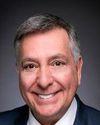It would be a seamless transition, so as they walk out the back door of the Canadian Forces, during their SCAN seminar, which my colleague mentioned earlier, they'd be aware of accessing these hubs. The first thing the soldier would do is contact the hub to say, “I'm retiring on June 15, 2023. I'm looking for a primary care provider. I'm moving to St. Albert, in the Edmonton area. Can you help me out?”
The task force would be able to dig into its database to determine, with its network of hubs in the Edmonton area, which physicians are looking after veterans, and if we have a specific veteran clinic there with a family doc and a veteran physician assistant ready to receive that patient.



